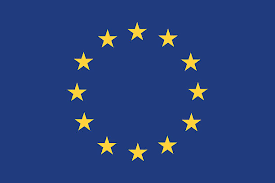
SNS JU April 2025 Newsletter
EuCNC & 6G Summit 2025
Shaping the Future of Connectivity: EuCNC & 6G Summit 2025 Heads to Poznań
Following its successful 2024 edition in Antwerp, the 2025 EuCNC & 6G Summit will take place from 3 to 6 June 2025 in Poznań, Poland. As the premier annual event for Beyond 5G and 6G innovation in Europe, the Summit brings together two flagship conferences: EuCNC, now in its 34th edition and supported by the European Commission, and the 6G Summit, in its 7th edition, launched by Finland’s 6G Flagship programme. Backed by leading institutions including IEEE ComSoc, EURASIP, and EurAAP, the event offers a dynamic platform for cutting-edge research, policy dialogue, and industry collaboration.
Attracting nearly 900 participants from over 40 countries, with more than 50 technology exhibitors, the Summit is a cornerstone of Europe’s connectivity roadmap, covering critical areas such as:
- 6G Architectures and Network Evolution
- AI and Machine Learning for Networks
- Integrated Sensing and Communication (ISAC)
- Security, Trust, and Quantum Technologies
- Terrestrial and Non-Terrestrial Network Integration
- Hardware and Photonics Innovation
- Experimental Platforms, Trials, and Standards
- Sustainable and Societal Aspects of 6G
- Emerging 6G Use Cases and Applications
This year, SNS JU projects will take a prominent role in shaping the discourse on future connectivity. Their contributions—ranging from live demonstrations and technology showcases to tutorials, papers, and special sessions—highlight the maturity and strategic alignment of the SNS programme with Europe’s digital ambitions.
Key sessions will spotlight collaborative work across SNS projects and working groups, particularly in the areas of sustainability, trust frameworks, NTN integration, and 6G testing environments. Beyond the technical programme, SNS projects will also enhance their outreach through social media, publications, and interactive engagements.
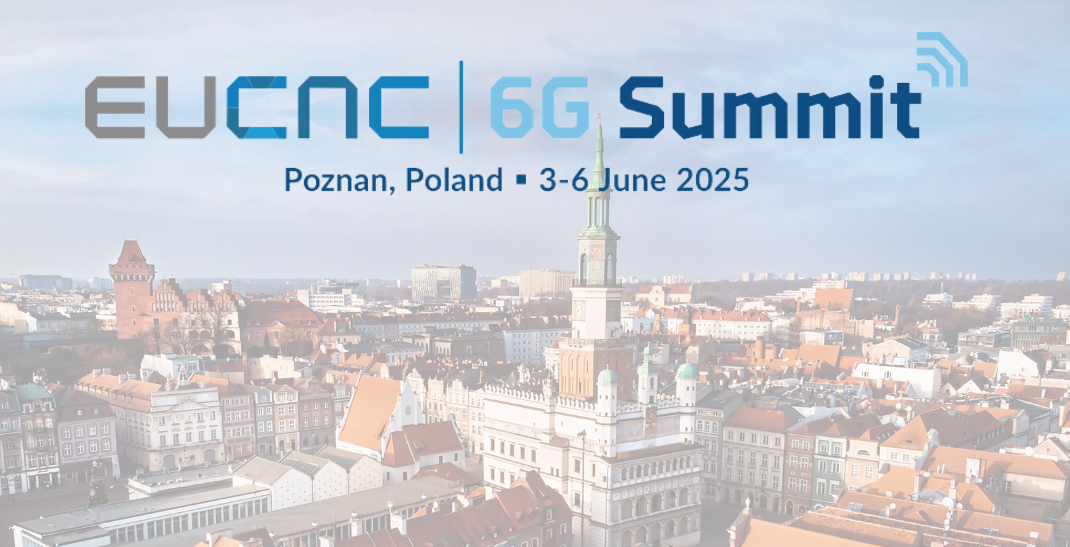
Taking place in the context of the SNS JU’s fourth Call for Proposals and the launch of the Digital Europe Programme’s 2025–2027 Work Programme, the Summit will be a pivotal moment for Europe’s digital and connectivity research ecosystem.
? Stay tuned for further announcements via the official EuCNC at & 6G Summit channels at EuCNC & 6G Summit

SNS Call for Proposals 2025 officially launched
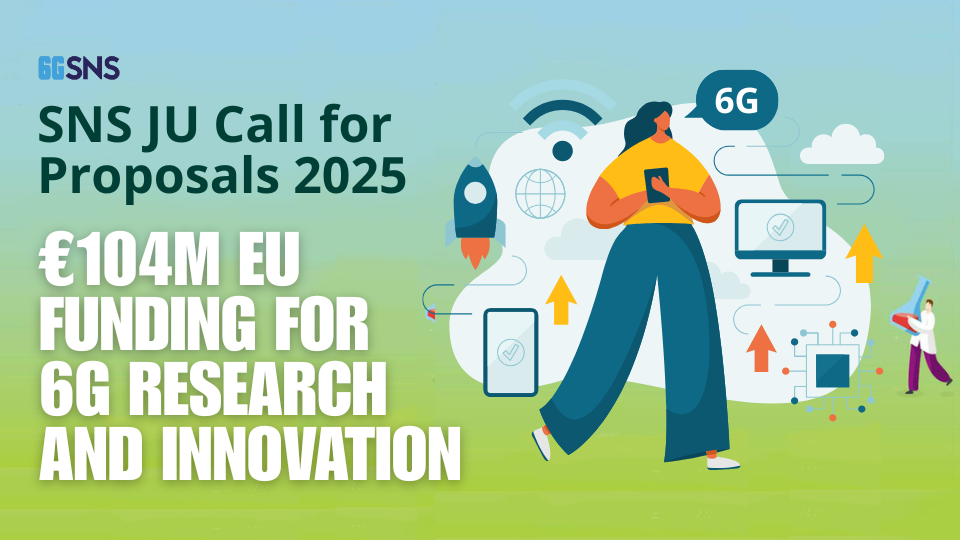
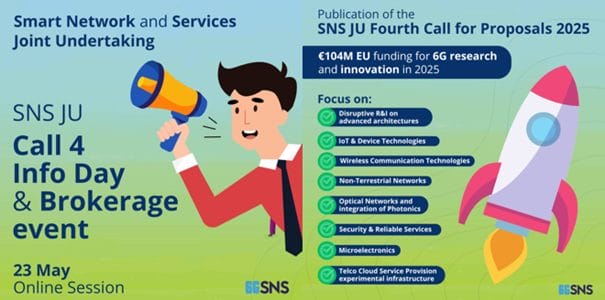
On 14 April 2025, the Smart Network and Services Joint Undertaking (SNS JU) published its fourth Call for proposals on the EU Funding and Tenders Portal The Call will open on 22 May 2025, and participants can submit their proposals online until 18 September 2025.
On 11 April 2025, the Smart Networks and Services Joint Undertaking (SNS JU) Governing Board adopted its amended Research & Innovation (R&I) Work Programme 2025, announcing €104 million of EU funding for its fourth Call (1st Call of 2025) to advance 6G Research and Innovation.
The SNS JU plays a key role in the implementation of an ambitious investment package, by managing an EU budget of €900 million for the period 2021-2027. The private sector will contribute with equal resources over the same period. This Fourth Call will expand on the 80 SNS JU projects that were selected from the first three SNS JU call for proposals.
Potential applicants will have the opportunity to learn more and ask questions at the SNS JU Call 4 Information Day, taking place on 23 May 2025. They can also share their ideas and find partners by attending the SNS brokerage event that will take place on 23 May 2025 and by joining the SNS brokerage platform.
Retained projects from this Call will support research and innovation activities through two complementary streams:
- Stream B: Advanced research for revolutionary and evolutionary technology advancements, including Topics on 6G Disruptive Technologies.
- Stream C: Development of a 6G Telco Cloud and service platform experimental infrastructure
The SNS JU Call 4 publication announcement follows the successful implementation of previous calls, which have already committed over €500 million to boost beyond 5G and 6G research and innovation across Europe.
“European SME Expertise in 5G and Beyond 2024” Brochure Now Available
The 9th edition of the NetworldEurope European SME Expertise in 5G and Beyond brochure is here, offering a detailed overview of the key players driving innovation in next-generation networks.
Developed by the NetworldEurope SME Working Group, this resource serves as a practical tool for industry leaders, research institutions, and policymakers seeking innovative SME partners for collaborative research and innovation projects and business opportunities.
Inside the 2024 edition:
- 80+ SME profiles showcasing expertise, achievements, and collaboration opportunities.
- 20+ success stories from major European and global projects.
- An updated online SME catalogue for easy partner discovery.
This initiative strengthens the visibility of SMEs expertise and their role in driving technological progress within the European innovation ecosystem.
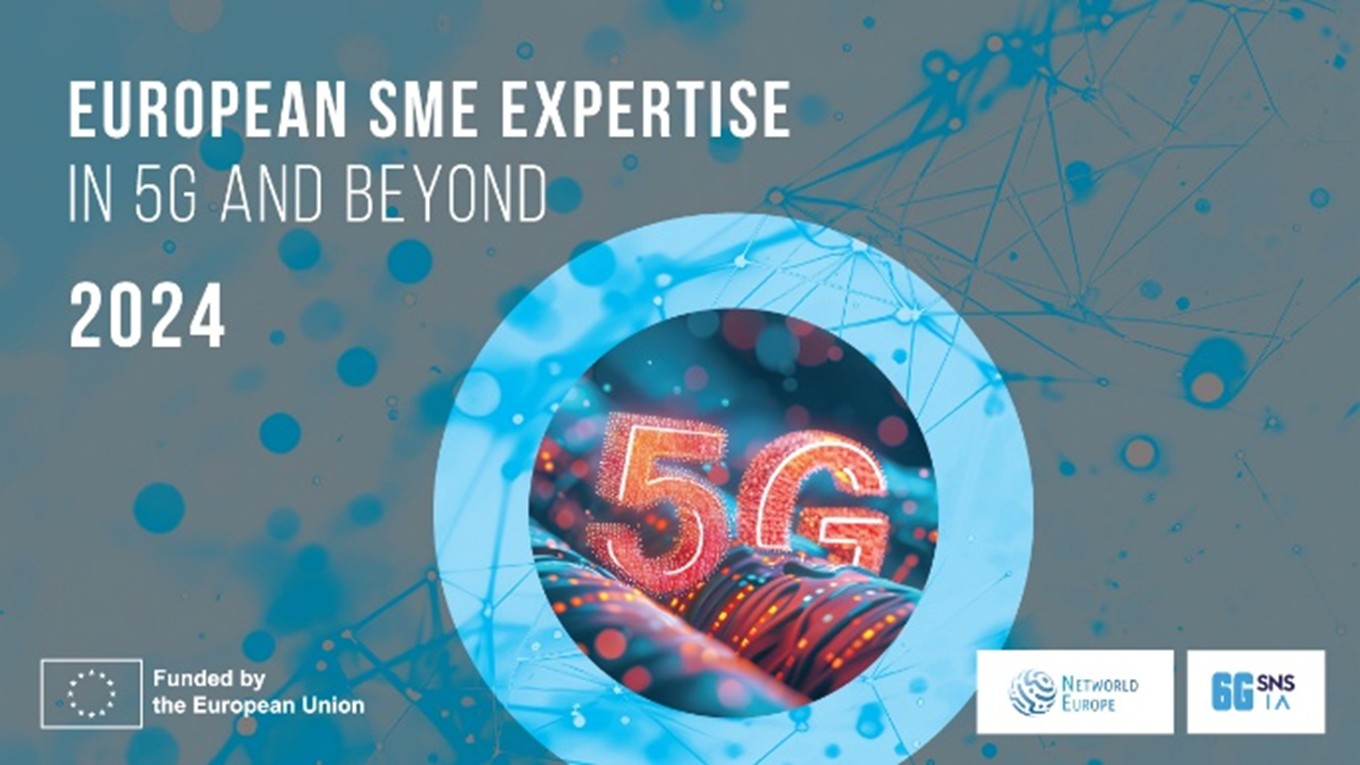
EU launches InvestAI initiative to mobilise €200 billion of investment in artificial intelligence
At the 2025 Artificial Intelligence Action Summit held on 10-11 February in Paris, European Commission President Ursula von der Leyen unveiled InvestAI (full press release), a transformative initiative aimed at mobilising €200 billion in public and private investment to accelerate Europe’s leadership in artificial intelligence. This ambitious programme marks a major step toward establishing Europe as a global AI powerhouse and aligns with the EU’s broader vision for digital sovereignty and technological innovation.
Through InvestAI, the Commission will channel capital into building AI Gigafactories large-scale computing infrastructures modeled after CERN, designed to support open collaboration between researchers, startups, and industry leaders. These gigafactories will be equipped with around 100,000 next-generation AI chips, four times the computing capacity of the AI factories currently being deployed. They will power the development of the most advanced AI models and unlock innovations across vital sectors like healthcare, science, and climate.
InvestAI is backed by a layered funding structure, blending EU budget instruments such as the Digital Europe Programme, Horizon Europe, and InvestEU, with contributions encouraged from Member States and private investors. The initial phase includes a €20 billion fund dedicated to the gigafactories, forming the core of what President von der Leyen describes as “a CERN for AI.” This public-private partnership will democratize access to cutting-edge infrastructure, allowing not just tech giants, but also SMEs and research teams, to participate in shaping the future of trustworthy AI.
The initiative builds on the momentum of existing investments: the EU has already allocated €10 billion toward the development of 13 AI Factories, enabling startups and researchers to leverage Europe’s supercomputing capabilities. These facilities are already the largest public AI investment in the world and have started attracting global interest and collaboration.
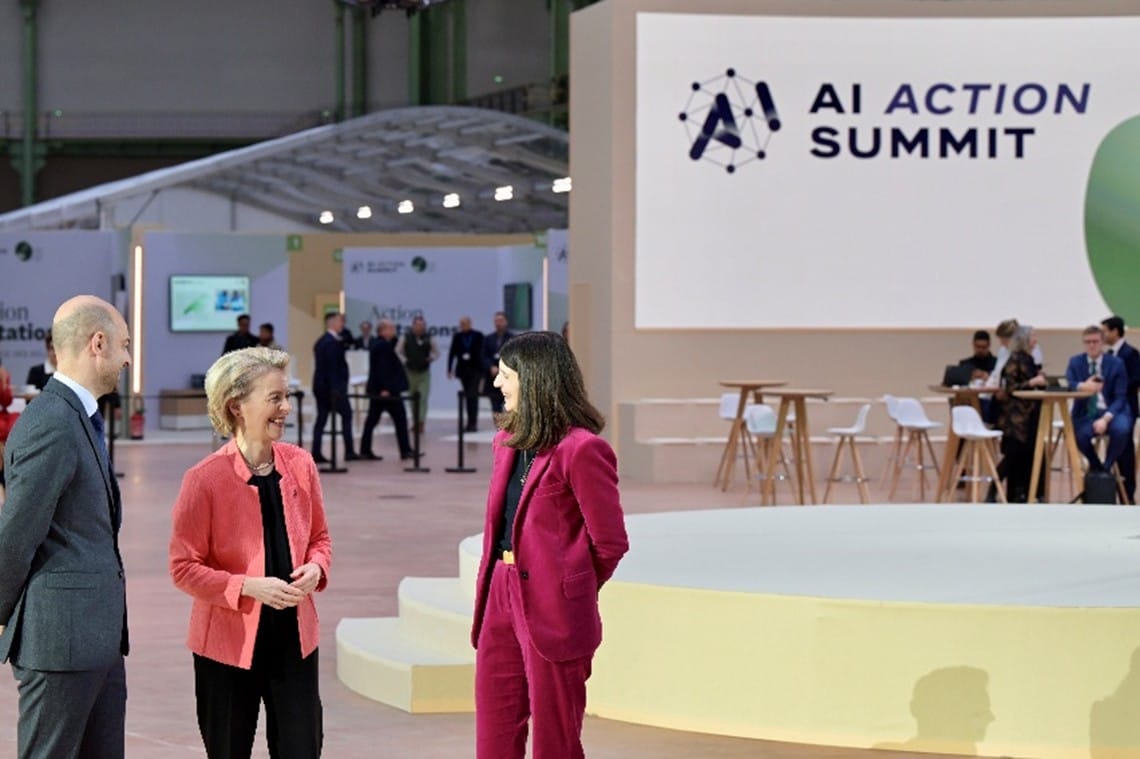
Commission sets course for Europe’s AI leadership with an AI Continent Action Plan
InvestAI is a central pillar of the broader AI Continent Action Plan (full press release), a high-level strategy launched by the European Commission to make Europe a global leader in artificial intelligence. This Action Plan sets out a roadmap built on five key pillars:
- Large-Scale Infrastructure for AI
A robust AI ecosystem requires access to computational power and data. The plan supports the creation of both AI Factories and AI Gigafactories, ensuring European startups and researchers have the tools to develop next-generation AI models. It also includes the upcoming Cloud and AI Development Act, aiming to triple the EU’s data centre capacity.
- Access to High-Quality Data
The Commission will launch a Data Union Strategy and establish Data Labs to curate large volumes of high-quality datasets, essential for AI training and innovation.
- AI Adoption Across Strategic Sectors
Despite its potential, AI adoption in the EU remains limited. The upcoming Apply AI Strategy will promote sector-specific AI use, supported by the AI Factories and European Digital Innovation Hubs, particularly in areas like health, manufacturing, climate, and public services.
- AI Skills and Talent Development
To ensure a sustainable talent pipeline, the EU will boost AI-related education, training, and international talent recruitment via initiatives like the AI Skills Academy and the MSCA Choose Europe programme.
- Regulatory Support and Simplification
With the AI Act now in force, the Commission will launch the AI Act Service Desk to support compliance and offer guidance to businesses and developers, ensuring a balance between innovation and trust.
This holistic approach underlines Europe’s commitment to shaping a future where AI is not only powerful and innovative, but also inclusive, open, and beneficial to society. As President von der Leyen stated, “AI can be a gift to humanity—but we must make sure that benefits are widespread and accessible to all. We want AI to be a force for good.”
2025 Commission work programme adopted
On 11 February 2025, the European Commission adopted its 2025 Work Programme, outlining key priorities for the first year of its new mandate. Rooted in President von der Leyen’s Political Guidelines, the programme focuses on fostering sustainable prosperity, enhancing European security, and strengthening economic resilience, while responding to the pressing concerns of EU citizens and businesses.
Key Priorities and Initiatives:
- Sustainable Prosperity & Competitiveness
- Defence & Security
- Social Fairness & Skills
- Quality of Life & Environment
- Democracy & European Values
- Global Engagement
- Future-Proofing the EU
This work programme signals a proactive and coordinated approach to shaping the EU’s digital, green, and geopolitical future, aiming to deliver tangible results for citizens while preparing Europe for upcoming global challenges.
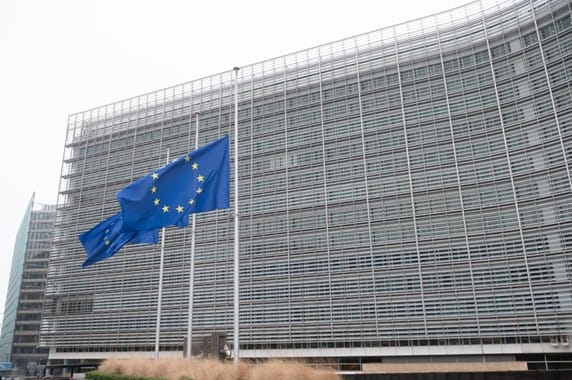
EU and India reinforce strategic ties during landmark visit of the College to New Delhi
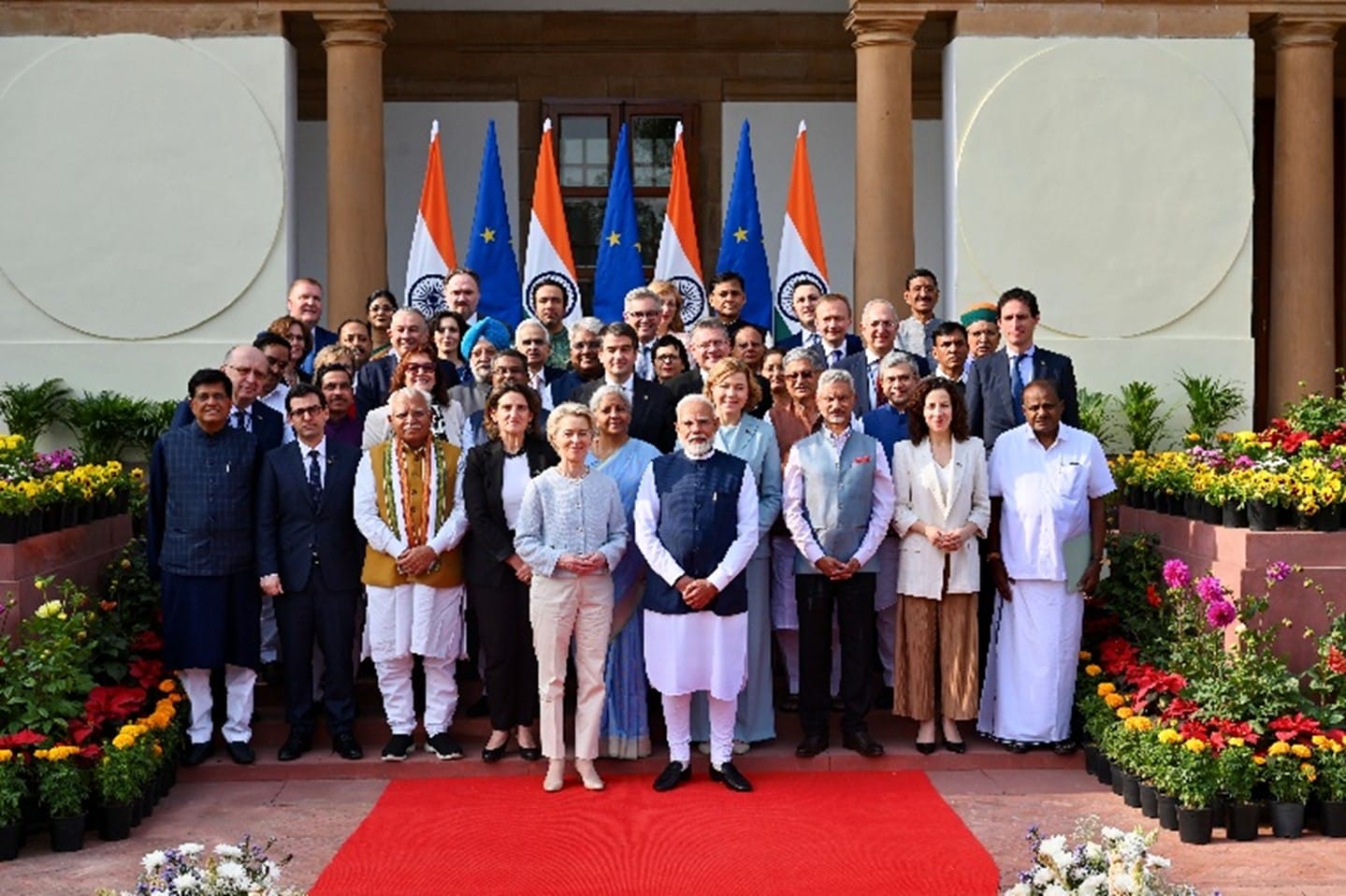
On 28 February 2025, during a landmark visit of the European Commission’s College to New Delhi, the EU and India took major steps to reinforce their strategic partnership, with a strong emphasis on digital cooperation and next-generation connectivity.
President Ursula von der Leyen and Prime Minister Narendra Modi agreed to elevate their collaboration on emerging technologies, highlighting 5G, 6G, artificial intelligence, semiconductors, and high-performance computing as core areas of future engagement.
The visit reaffirmed the role of the EU-India Trade and Technology Council (TTC) as a central pillar for joint innovation. Its second high-level meeting outlined tangible progress in digital policy coordination and underscored a joint ambition to co-develop secure, resilient digital infrastructure.
A highlight of the visit was the announcement of plans for a high-speed data cable as part of the India-Middle East-Europe Corridor (IMEC) – a project that aims to connect major innovation ecosystems and accelerate digital trade and cooperation. The corridor is expected to significantly enhance data flows, promote clean tech, and support secure 6G connectivity between regions.
President von der Leyen emphasized that in a rapidly shifting global landscape, EU-India digital alignment is essential not only for economic growth but also for ensuring security and technological sovereignty.
With digital at the heart of the renewed EU-India Strategic Agenda, the two partners are paving the way for a future-proof, innovation-driven alliance.
EOSC takes next steps to establish a federation for sharing research data and digital resources across Europe
On 25 March in Krakow, the European Open Science Cloud (EOSC) Tripartite Governance took decisive steps toward building a federated digital infrastructure for research across Europe, reaffirming EOSC’s central role in shaping a data-driven, innovation-powered research ecosystem.
With the aim of becoming a key enabler of a “fifth freedom” free flow of knowledge and innovation, EOSC is evolving into a pan-European federation of interoperable services and infrastructures. The build-up phase, initiated during a milestone meeting of 75 representatives from Europe’s scientific and digital communities in Brussels, is now fully underway. Participants shared forward-thinking use cases set to drive EOSC’s value for researchers and digital service providers alike.
To support this expansion, the upcoming EOSC Federation Handbook will serve as a foundational guide for organisations joining the ecosystem, offering clear pathways on architecture, governance, operations, and policy alignment. Developed with input from over 40 experts, the handbook is designed to foster transparency, cohesion, and scale within the Federation.
The EOSC Steering Board, comprising national experts and Horizon Europe representatives, underscored EOSC’s pivotal role in boosting Europe’s competitiveness, research sovereignty, and capacity for digital innovation. In its latest opinion paper, the Board positioned EOSC as an engine for smarter science, secure data collaboration, and a cornerstone of Europe’s digital future.
By enabling seamless access to research data and services across borders and disciplines, EOSC embodies the EU’s vision of a trusted, open, and connected digital research space. As it moves toward a sustainable model beyond 2027, EOSC is not just supporting science, it is redefining the digital landscape of European innovation.

Commission to invest €1.3 billion in artificial intelligence, cybersecurity and digital skills

On March 28, 2025, the European Commission unveiled a €1.3 billion investment package under the Digital Europe Programme (2025–2027), aimed at boosting strategic digital technologies and reinforcing Europe’s tech sovereignty.
Key areas of investment include:
- Artificial Intelligence (AI): Enhancing access to generative AI, especially in health and care, supporting the AI Act’s rollout, and advancing the AI Factories initiative for public and private use.
- Digital Innovation Hubs (EDIHs): Expanding technical support and training to accelerate AI adoption across businesses and public sectors.
- Destination Earth: Scaling up Europe’s digital twin of the planet to improve climate resilience and disaster management.
- Cybersecurity: Strengthening cyber resilience with tools like the EU Cybersecurity Reserve to protect critical infrastructure.
- Digital Skills: Empowering education and training institutions to attract talent and foster advanced digital competencies in the workforce.
- Digital Identity & Public Services: Supporting the deployment of the EU Digital Identity Wallet and modernizing digital public services across Member States.
The investment will also fuel innovation through the Strategic Technologies for Europe Platform (STEP), awarding quality labels to high-potential projects to attract funding.
The first calls for proposals are expected in April 2025, open to public and private entities from EU Member States and associated countries.
ECCC to finance €390 million in cybersecurity projects under Digital Europe Programme for 2025-2027
On 28 March 2025, the European Cybersecurity Competence Centre (ECCC) has adopted its first Cybersecurity Work Programme under the Digital Europe Programme, allocating €390 million for 2025–2027. This strategic investment marks a major step in reinforcing Europe’s cyber resilience and technological sovereignty.
Key focus areas include:
- Next-Gen Cyber Technologies: Funding AI-driven cybersecurity systems, secure and resilient AI models, and infrastructure for Europe’s post-quantum transition, enabling faster threat detection and smarter cyber threat intelligence.
- Cyber Resilience for SMEs: Supporting compliance with EU cybersecurity laws and encouraging the development of secure hardware and software tailored for small and medium-sized enterprises.
- Cyber Solidarity Act Implementation: Supporting the establishment of the European Cybersecurity Alert System (ECAS) and a pan-European network of Cyber Hubs, boosting coordinated detection and response capabilities across Member States.
- Critical Infrastructure Protection: Enhancing the cyber resilience of healthcare, communications, and undersea infrastructure (e.g. submarine cables), while integrating requirements from key EU regulations like NIS 2, DORA, GDPR, and the AI Act.
ECCC Executive Director Luca Tagliaretti emphasized the importance of this first cybersecurity work programme as a milestone in building a cyber-secure and resilient Europe.
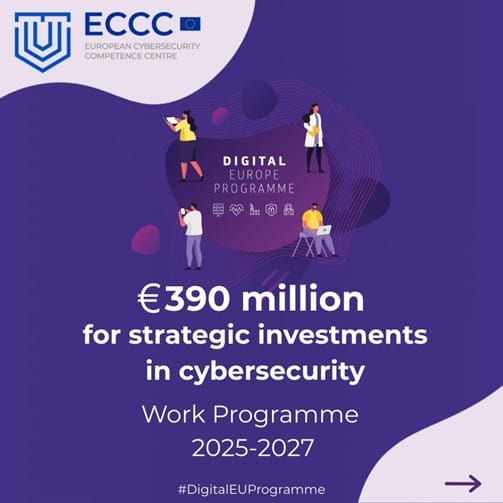
First Horizon Europe Association JCM & Roadshow in Canada
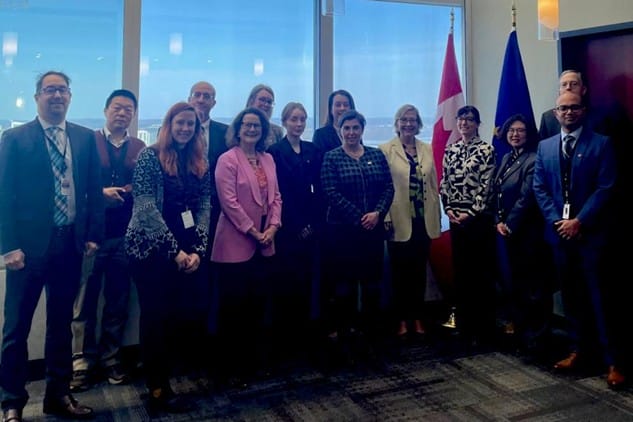
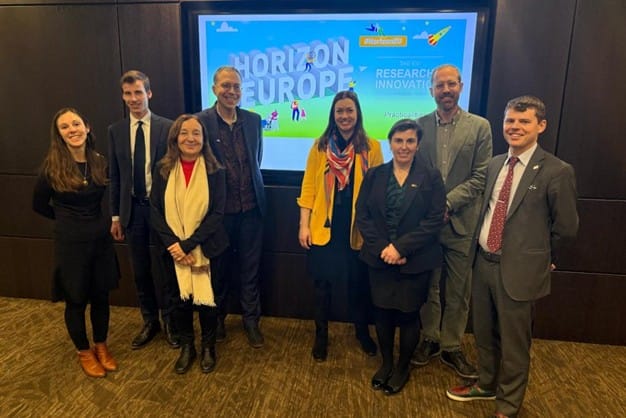
On 19 March 2025, the first Horizon Europe Association Joint Committee Meeting (JCM) between Canada and the European Union took place in Ottawa, marking a significant milestone since Canada joined Pillar II of Horizon Europe in July 2024. Co-chaired by Marie-Hélène Légaré (ISED Canada) and Signe Ratso (European Commission), the meeting reviewed Canada’s integration into the programme and laid the groundwork for deeper, long-term cooperation in research and innovation (R&I).
Key topics included:
- Canadian participation in EU research governance and infrastructures;
- Enhancing visibility and uptake of Horizon Europe across Canada;
- Joint planning around 2025–2027 work programmes and Horizon Europe’s successor (Framework Programme 10, set for 2028);
- Promoting reciprocity and mutual benefits in R&I collaboration.
The JCM reaffirmed a strong mutual commitment to advancing science and tackling global challenges together as like-minded partners.
Horizon Europe Roadshow: Connecting Canadian Researchers with Europe
To accompany the JCM, the EU and ISED Canada launched a Horizon Europe roadshow across Canada in March 2025. The initiative aimed to help Canadian researchers and innovators fully engage with the programme. Events held in Vancouver, Edmonton, Saskatoon, Montréal, Halifax, and St. John’s featured experts from the European Commission, EU Delegation to Canada, and partners such as ERCEA, Euraxess, and Horizon Academy.
Sessions offered practical guidance on how to access funding, apply to calls, and navigate evaluation processes. The roadshow’s success, built on a strong “Team Europe” collaboration, attracted wide participation from academia and industry, underscoring the enthusiasm for deeper EU–Canada scientific collaboration.
Together, these milestones reflect a new chapter in EU–Canada R&I relations, rooted in shared values, scientific excellence, and a joint commitment to solving pressing global issues.

- TARGET-X Webinar How to evaluate the Impact of 5G Use Cases in Industry, 8 May 2025
- The First IEEE/IFIP WebAssembly, Cloud and Edge: Shaping the Future of Computing (WACE) Workshop, 12-16 May 2025
- EC Cluster 4 WP2025 Info Days, 13-14 May 2025
- 16th ITS European Congress, 19-21 May 2025
- TFS#7 Plenary, Hackfest and Ecosystem Day, 19-22 May 2025
- CENTRIC Webinar on Physical Layer Methods for AI-native 6G Air-Interface, 21 May 2025
- PSCE Spring Conference 2025, 21-22 May 2025
- IEEE International Conference on Machine Learning for Communication and Networking, 26-29 May 2025
- EuCNC & 6G SUMMIT 2025, 3-6 June 2025
- Fourth International Workshop on Green and Sustainable Networking (GreenNet 2025), 8-12 June 2025
- ICC 2025, 8-12 June 2025
- TNC 2025, 9-13 June 2025
- VTC Spring 2025, 17-20 June 2025
- Techritory 2025, 22-23 October 2025
- Brooklyn 6G Summit, 23-25 October 2025

